
- Average Rating:
- 5
- Categories:
- Cannabis | Cross Border Markets & Commerce | supply chain
- Faculty:
- Lara DeCaro | Griffen Thorne | Sally Brammell | Michelle Li
- Duration:
- 1 Hour 9 Minutes
- Format:
- Audio and Video
- SKU:
- INCBA060225tariffod
- License:
- Access for 6 month(s) after purchase.
- Short Description:
- This presentation explores the potential impact of U.S. tariffs on the smokeables, cannabis, and hemp industries, focusing on how trade policy changes could influence supply chains, equipment costs, and global competitiveness, and how attorneys can protect against or help clients prepare for those impacts.
- Price:
- $30.00 - $75.00

- Average Rating:
- 19
- Categories:
- Hemp Law | Licensing and Permitting
- Faculty:
- Steve Schain | Diana Eberlein | Andrea Steel | Courtney Moran, LL.M.
- Duration:
- 1 Hour 6 Minutes
- Format:
- Audio and Video
- SKU:
- INCBA032725tidalod
- License:
- Access for 6 month(s) after purchase.
- Short Description:
- Cropping up for sale online and over-the-counter in retailers (including major liquor stores, grocery stores and bars), non-alcoholic Hemp-derived tetrahydrocannabinol (“THC”) infused beverages cause psychoactive effects without being legally labeled, or regulated, as “Cannabis”.
- Price:
- $30.00 - $75.00
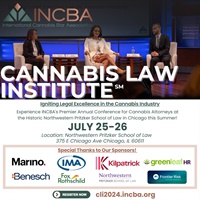
- Average Rating:
- Not yet rated
- Bundle(s):
- CLI2024 On-Demand
- Faculty:
- Toni Forge, Esq. | Tom Haren | Jonathan Robbins | Bryna Dahlin
- Duration:
- 1 Hour 4 Minutes
- Format:
- Audio and Video
- SKU:
- INCBA091624adultOD
- License:
- Access for 6 month(s) after purchase.
- Short Description:
- As cannabis legalization sweeps across the United States, legislators, regulators, and the industry must improve and mesh future state and federal adult-use policy, armed with lessons from states that pioneered adult-use programs. Learn what worked and what must change.
- Price:
- $30.00 - $75.00

- Average Rating:
- Not yet rated
- Bundle(s):
- CLI2024 On-Demand
- Faculty:
- Mitzi Vaughn | Pamela Epstein | Andrea Steel | Nabil Rodriguez
- Duration:
- 1 Hour
- Format:
- Audio and Video
- SKU:
- INCBA091624d8d9OD
- License:
- Access for 6 month(s) after purchase.
- Short Description:
- Intoxicating hemp cannabinoids are the source of a growing tide of lawsuits. Learn who the litigants are, why they want or don't want these products sold, what jurisdictions are feeling the brunt of the fight, and where the fight seems to be heading next.
- Price:
- $30.00 - $75.00

- Average Rating:
- Not yet rated
- Bundle(s):
- CLI2024 On-Demand
- Faculty:
- Akshita Singh | Katy Young | Lauren Rudick | Casey Grabenstein
- Duration:
- 1 Hour
- Format:
- Audio and Video
- SKU:
- INCBA091624litigOD
- License:
- Access for 6 month(s) after purchase.
- Short Description:
- Never short on litigation, state licensing schemes are mired in lawsuits in 2024. Explore not only constitutional challenges, but also clashes between states and agencies over licensing, including third-party contractor error, discrimination, and abuse of discretion.
- Price:
- $30.00 - $75.00

- Average Rating:
- 1
- Bundle(s):
- CLI2024 On-Demand
- Faculty:
- Neil M. Kaufman, Esq. | Kellie Rivera | David Feldman | Samantha Gleit
- Duration:
- 1 Hour 5 Minutes
- Format:
- Audio and Video
- SKU:
- INCBA091624saferOD
- License:
- Access for 6 month(s) after purchase.
- Short Description:
- A discussion of the how rescheduling, the potential end of 280E, and the SAFER Banking Act will impact the currently moribund cannabis financing and mergers and acquisitions.
- Price:
- $30.00 - $75.00

- Average Rating:
- Not yet rated
- Bundle(s):
- CLI2024 On-Demand
- Faculty:
- Kelly D. Fair | Mr. Michael Joseph Heaton, Esq. | Mr. Robert Martin Tobiassen, J.D., LLM Taxation
- Duration:
- 1 Hour 2 Minutes
- Format:
- Audio and Video
- SKU:
- INCBA091624faultOD
- License:
- Access for 6 month(s) after purchase.
- Short Description:
- Recent developments have convinced many that the DEA will seek to transfer cannabis to schedule III of the Controlled Substances Act soon. Yet the mechanics of the administrative process and the implications of the proposed change are not well understood. Our panel will discuss the role of other federal agencies in the scheduling review process, the legal implications of cannabis’s scheduling status under federal law, and the implications rescheduling would have for state-regulated cannabis markets, FDA enforcement, and more.
- Price:
- $30.00 - $75.00

- Average Rating:
- 1
- Bundle(s):
- CLI2024 On-Demand
- Faculty:
- Fatima Afia | Jason Horst | Rebecca Stamey-White | Thomas (Tommy) Tobin
- Duration:
- 1 Hour 6 Minutes
- Format:
- Audio and Video
- SKU:
- INCBA091624dormOD
- License:
- Access for 6 month(s) after purchase.
- Short Description:
- Lawsuits around the country based on a constitutional principle referred to as the "dormant Commerce Clause" have upended the cannabis industry over the past two years. We will discuss the merits of these cases and how they may impact the shape and trajectory of the industry.
- Price:
- $30.00 - $75.00

- Average Rating:
- Not yet rated
- Bundle(s):
- CLI2024 On-Demand
- Faculty:
- Shabnam Malek | James Gourley | Brian Ruden | Mitchel Kay
- Duration:
- 1 Hour 1 Minutes
- Format:
- Audio and Video
- SKU:
- INCBA091624expanOD
- License:
- Access for 6 month(s) after purchase.
- Short Description:
- How should clients in the cannabis space expand into new markets? Here, industry lawyers will share their expertise in navigating IP licensing, partnerships, joint ventures, and more. Learn which strategies can accelerate your clients’ growth and which could pose risks.
- Price:
- $30.00 - $75.00

- Average Rating:
- Not yet rated
- Bundle(s):
- CLI2024 On-Demand
- Categories:
- Ethics
- Faculty:
- Marialle A. Bell | Jana Weltzin, Esq. | Carmen J. Williams
- Duration:
- 1 Hour 1 Minutes
- Format:
- Audio and Video
- SKU:
- INCBA091624cotranOD
- License:
- Access for 6 month(s) after purchase.
- Short Description:
- Designed to counter drug trafficking, money laundering, and other financial crimes, the Corporate Transparency Act poses particular challenges for the cannabis industry, such as fully disclosing beneficial owners in an industry still prohibited under federal law.
- Price:
- $30.00 - $75.00

- Average Rating:
- Not yet rated
- Bundle(s):
- CLI2024 On-Demand
- Categories:
- Ethics
- Faculty:
- Joslin E. Monahan | Sari W Montgomery | Mary L. Tabin
- Duration:
- 1 Hour 1 Minutes
- Format:
- Audio and Video
- SKU:
- INCBA091624fireOD
- License:
- Access for 6 month(s) after purchase.
- Short Description:
- The relatively sudden legalization of commercial cannabis has led attorneys to take on multiple roles for clients: brokers, business consultants, legal counselors, and more. Learn to identify ethical pitfalls in taking multiple jobs for a client - and when you must decline.
- Price:
- $30.00 - $75.00

- Average Rating:
- Not yet rated
- Bundle(s):
- CLI2024 On-Demand
- Faculty:
- Richard Y. Cheng, Esq., CHC | Aleah M. Schutze
- Duration:
- 1 Hour
- Format:
- Audio and Video
- SKU:
- INCBA091624stigOD
- License:
- Access for 6 month(s) after purchase.
- Short Description:
- As cannabis is incorporated in healthcare, providers and patients face new legal challenges in everything from licensing, payors, and accreditation hurdles, to DEA registrations, controlled-substance prescribing rules, fraud, right-to-try laws, and FDA oversight. With anticipation of rescheduling of cannabis to Schedule III substance, there will be a discussion on how it impacts healthcare delivery, patient access and provider liability issues.
- Price:
- $30.00 - $75.00

- Average Rating:
- Not yet rated
- Bundle(s):
- CLI2024 On-Demand
- Faculty:
- Zachary Kobrin | Carolyn Pellegrini | Taylor Stevens | Thomas Y. Mandler | David Suetholz
- Duration:
- 1 Hour 3 Minutes
- Format:
- Audio and Video
- SKU:
- incba091624peaceod
- License:
- Access for 6 month(s) after purchase.
- Short Description:
- Distinguished labor law practitioners will lead a lively discussion of the key labor law concepts and issues every cannabis lawyer should understand, from the National Labor Relations Act to Labor Peace Agreements.
- Price:
- $30.00 - $75.00

- Average Rating:
- Not yet rated
- Bundle(s):
- CLI2024 On-Demand
- Faculty:
- Mr. Shay Aaron Gilmore | Ruth A. Rauls, Esq. | David White | Kimberly Ohanuka, Esq.
- Duration:
- 1 Hour 1 Minutes
- Format:
- Audio and Video
- SKU:
- INCBA091624wireOD
- License:
- Access for 6 month(s) after purchase.
- Short Description:
- Learn about the legal implications of new anti-discrimination protections for employees who consume cannabis, the use of "impairment expert" roles, and how employers can continue to enforce drug-free workplace policies while not violating cannabis use nondiscrimination laws.
- Price:
- $30.00 - $75.00

- Average Rating:
- Not yet rated
- Bundle(s):
- CLI2024 On-Demand
- Categories:
- International Drug Policy | International Law
- Faculty:
- Marie Sanchez | Eric P. Berlin | Sherri Altshuler | Paul-Michael Keichel | Mr. Ohad Kiperstok
- Duration:
- 1 Hour 1 Minutes
- Format:
- Audio and Video
- SKU:
- INCBA091624interOD
- License:
- Access for 6 month(s) after purchase.
- Short Description:
- Get practical insight on the key challenges cannabis and hemp operators are likely to face when engaging in international activities and expansion.
- Price:
- $30.00 - $75.00

- Average Rating:
- Not yet rated
- Bundle(s):
- CLI2024 On-Demand
- Faculty:
- Meital Manzuri | Ms. Dina Rollman | Serena Wu | Matthew Brockmeier
- Duration:
- 1 Hour 3 Minutes
- Format:
- Audio and Video
- SKU:
- INCBA091624psyOD
- License:
- Access for 6 month(s) after purchase.
- Short Description:
- From the start, psychedelics are walking a different path towards legalization than cannabis. Learn about the different types and programs and why the roll out is different than cannabis - and discover why some advocates are seeking an alternate destiny from cannabis.
- Price:
- $30.00 - $75.00
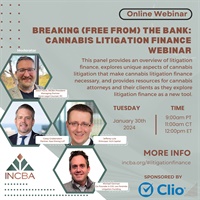
- Average Rating:
- 6
- Categories:
- Cannabis Banking and Finance
- Faculty:
- Jason Horst | Casey Grabenstein | Jeffery Lula | Michael German
- Duration:
- 1 Hour 5 Minutes
- Format:
- Audio and Video
- SKU:
- INCBA013024financeOD
- License:
- Access for 6 month(s) after purchase.
- Short Description:
- This panel provides an overview of litigation finance, explores unique aspects of cannabis litigation that make cannabis litigation finance necessary, and provides resources for cannabis attorneys and their clients as they explore litigation finance as a new tool.
- Price:
- $30.00 - $75.00
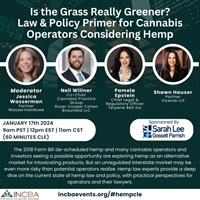
- Average Rating:
- 9
- Categories:
- Hemp | Hemp Law
- Faculty:
- Jessica Wasserman, JD | Neil Willner | Pamela Epstein | Shawn Hauser
- Duration:
- 1 Hour 30 Minutes
- Format:
- Audio and Video
- SKU:
- INCBA011724hemplawOD
- License:
- Access for 6 month(s) after purchase.
- Short Description:
- The 2018 Farm Bill de-scheduled hemp and many cannabis operators and investors fatigued by over-regulation are exploring hemp as an alternative market for intoxicating products. But an unregulated interstate market may be even more risky than potential operators realize. Hemp law experts provide a deep dive on the current state of hemp law and policy, with practical perspectives for operators and their lawyers.
- Price:
- $30.00 - $75.00
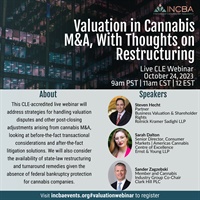
- Average Rating:
- 12
- Categories:
- Mergers & Acquisitions | Corporate Governance | Finance | Risk Management
- Faculty:
- Steven Hecht | Sarah Dalton | Sander Zagzebski
- Duration:
- 1 Hour 7 Minutes
- Format:
- Audio and Video
- SKU:
- INCBA102423valuOD
- License:
- Access for 6 month(s) after purchase.
- Short Description:
- This panel will address strategies for handling valuation disputes and other post-closing adjustments arising from cannabis M&A, looking at before-the-fact transactional considerations and after-the-fact litigation solutions. We will also consider the availability of state-law restructuring and turnaround remedies given the absence of federal bankruptcy protection for cannabis companies; it’s a hybrid event.
- Price:
- $30.00 - $75.00
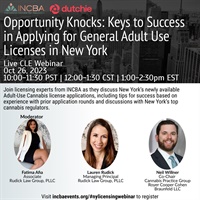
- Average Rating:
- 4
- Categories:
- Licensing | Licensing and Permitting | Regulation law
- Faculty:
- Fatima Afia | Lauren Rudick | Neil Willner
- Duration:
- 1 Hour 29 Minutes
- Format:
- Audio and Video
- SKU:
- INCBA102623nykeysOD
- License:
- Access for 6 month(s) after purchase.
- Short Description:
- Join licensing experts from Dutchie and INCBA as they discuss New York’s newly available Adult-Use Cannabis license applications, including tips for success based on experience with prior application rounds and discussions with New York’s top cannabis regulators. This program is accredited for 1 hour of CLE.
- Price:
- $30.00 - $75.00

- Average Rating:
- 2
- Bundle(s):
- Global Cannabis IP Symposium 2023 On-Demand Bundle
- Categories:
- Intellectual Property | IP law | Administrative Law | Ethics | Specialty Credits
- Faculty:
- Hannah Stitt | Rachael Dickson | Arturo Revilla | Jeffrey Merk
- Duration:
- 1 Hour 2 Minutes
- Format:
- Audio and Video
- SKU:
- INCBA092923ethicsOD
- License:
- Access for 6 month(s) after purchase.
- Short Description:
- Global Cannabis Intellectual Property Symposium 2023 session: Ethics: Balancing Activism and Zealous Advocacy with the Boundaries of the Profession and Evolving Law
- Price:
- $30.00 - $75.00
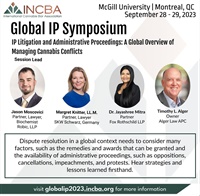
- Average Rating:
- 2
- Bundle(s):
- Global Cannabis IP Symposium 2023 On-Demand Bundle
- Categories:
- Intellectual Property | IP law | Administrative Law | Alternative Dispute Resolution | Litigation
- Faculty:
- Jason Moscovici | Dr. Jayashree Mitra | Timothy L. Alger | Margret Knitter, LL.M.
- Duration:
- 1 Hour 7 Minutes
- Format:
- Audio and Video
- SKU:
- INCBA092923iplitigOD
- License:
- Access for 6 month(s) after purchase.
- Short Description:
- Global Cannabis Intellectual Property Symposium 2023 session: IP Litigation and Administrative Proceedings: A Global Overview of Managing Cannabis Conflicts
- Price:
- $30.00 - $75.00

- Average Rating:
- 2
- Bundle(s):
- Global Cannabis IP Symposium 2023 On-Demand Bundle
- Categories:
- Intellectual Property | IP law | Patents & Trade Secrets
- Faculty:
- Sheila Gibson | Anthony Parker | Poonam Tauh | Gretchen L. Temeles
- Duration:
- 1 Hour 23 Minutes
- Format:
- Audio and Video
- SKU:
- INCBA092923patentsOD
- License:
- Access for 6 month(s) after purchase.
- Short Description:
- INCBA Global Cannabis Intellectual Property Symposium 2023 session: Cannabis Patents and Plant Variety Rights - Things to Know and Challenges Unique to the Cannabis Industry
- Price:
- $30.00 - $75.00

- Average Rating:
- 2
- Bundle(s):
- Global Cannabis IP Symposium 2023 On-Demand Bundle
- Categories:
- Copyrights and Trademarks | Intellectual Property | IP law
- Faculty:
- Mary Shapiro, JD, MBA | Natalie Rizkalla-Kamel | Katie Paterno, JD | Thomas Verborgh | Arturo Revilla
- Duration:
- 1 Hour 19 Minutes
- Format:
- Audio and Video
- SKU:
- INCBA092923brandsOD
- License:
- Access for 6 month(s) after purchase.
- Short Description:
- INCBA Global Cannabis Intellectual Property Symposium 2023 session: Global Protection of Cannabis Brands - Is it Possible?
- Price:
- $30.00 - $75.00

- Average Rating:
- 2
- Bundle(s):
- Global Cannabis IP Symposium 2023 On-Demand Bundle
- Categories:
- Copyrights and Trademarks | Intellectual Property | IP law | Risk Management
- Faculty:
- Amanda Conley | Marcelo Pomeranz | Laura Schniedwind | Pearl Chan | Soody Tronson
- Duration:
- 1 Hour 19 Minutes
- Format:
- Audio and Video
- SKU:
- INCBA092823toolOD
- License:
- Access for 6 month(s) after purchase.
- Short Description:
- Expand Your Toolbox: Creative Approaches to IP Licensing, Protection, and Exclusivity
- Price:
- $30.00 - $75.00

Product Type
- Faculty:
- Toni Forge | Tom Haren | Jonathan Robbins | Bryna Dahlin | Mitzi Vaughn | Pamela Epstein | Andrea Steel | Nabil Rodriguez | ....
